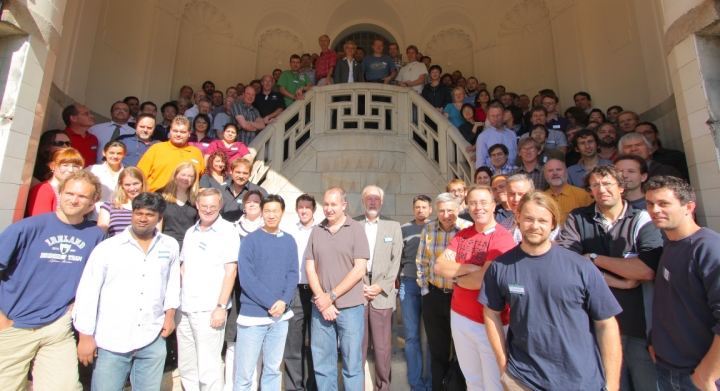|

Experts
of Carbon Dioxide (CO2)
Measurements in the atmosphere have met regularly for 34 years now,
with the
initial meeting organized by Dave Keeling at La Jolla,
California. The
major topics of these meetings include promotion of new techniques,
issues of standardization
and quality assurance and broadening of scope to other climate-relevant
trace
gases and proxies. The meetings provide an international forum for
discussing
recent developments, improvements, as well as problems and challenges
in the field
of precise measurements of atmospheric trace gases.
The
World Meteorological Organization (WMO)
has provided the umbrella to all CO2 Experts meetings,
including the
last one held in Helsinki at the FMI premises in September 2007
(http://www.fmi.fi/research_climate/climate_6.html).
Because of the increased use of carbon isotopes in studying the carbon
cycle,
the International Atomic Energy Agency (IAEA) in Vienna
joined WMO
as a co-organizer 1997.
The WMO Global
Atmosphere Watch (GAW) program, through its Scientific
Advisory
Group for Greenhouse Gases (SAG-GHG), member operated calibration and
quality
assurance facilities, and the World Data Centre for Greenhouse Gases,
helps to
coordinate the global network, promotes data quality objectives, and
provides
data management and links to users.
Measurements
of mixing ratios and isotopic composition of CO2, CH4
and other greenhouse gases are now made at over 100 globally
distributed
ground-based sampling locations as well as on ships and aircraft. About
20
laboratories from a dozen counties are measuring and reporting CO2
data.
They are assisted by personnel at GAW stations in WMO member countries
around
the world. Based on research results from this network the WMO
Greenhouse Gas
Bulletin was created
(http://www.wmo.int/pages/prog/arep/gaw/ghg/GHGbulletin.html).
Observations
are essential in understanding global and regional carbon
budgets
and cycles. Inverse modeling techniques use carbon cycle models and the
observed spatial/temporal distribution of greenhouse gases to derive
estimates
of the magnitude and distribution of the sources and sinks of these
gases.
Although model transport contributes the largest uncertainties to
estimates of
sources and sinks, there are still uncertainties associated with
inconsistencies in global observations. Since the 12th meeting in Toronto,
data
quality objectives are established for CO2, CH4, N2O
and the CO2 isotopes and subject to review on every meeting
(the recommendations
from the 2007 meeting in Helsinki can be downloaded from
http://www.fmi.fi/kuvat/14thExpertsRecom.pdf).
From
September 07 to 10 2009, the15th CO2 experts meeting in this series has
been hosted
by the Max-Planck Institute for Biogeochemistry in Jena, Germany. The
15th meeting has reviewed current WMO data quality objectives, covering
such topics as CO2, stable
isotopes, radiocarbon in CO2, O2/N2, CH4,
N2O, CO, and H2 measurements, calibration,
quality
control, data management, and archiving. New and emerging technology
have also
been discussed including measurements from satellites and flux tower
studies.

The Meeting Report will be
published by
WMO in
the GAW series (http://www.wmo.int/pages/prog/arep/gaw/gaw-reports.html
).
Previous meetings:
(Caution,
long files)
13th -- ftp://ftp.wmo.int/Documents/PublicWeb/arep/gaw/gaw168.pdf
14th -- http://www.wmo.int/pages/prog/arep/gaw/documents/GAW_186_TD_No_1487_web.pdf
Related Links:
|